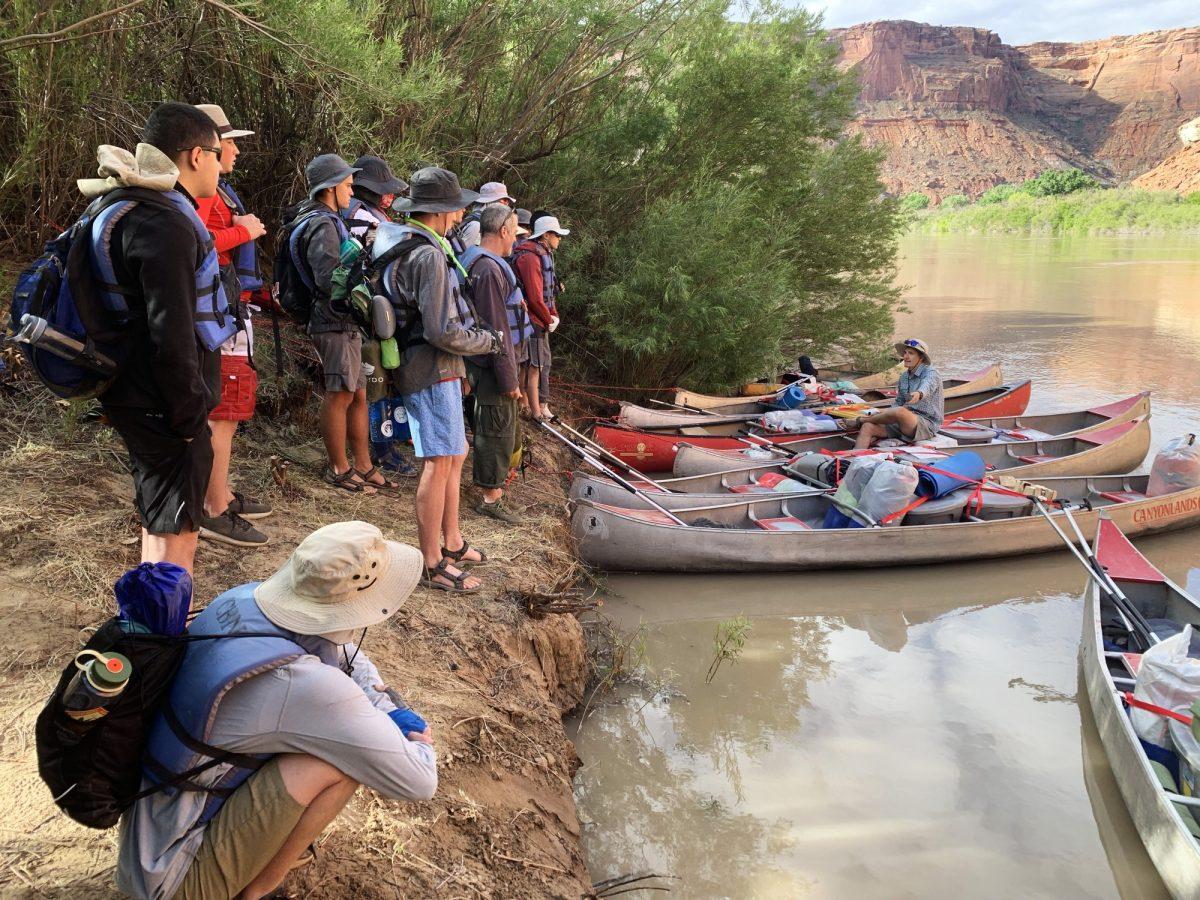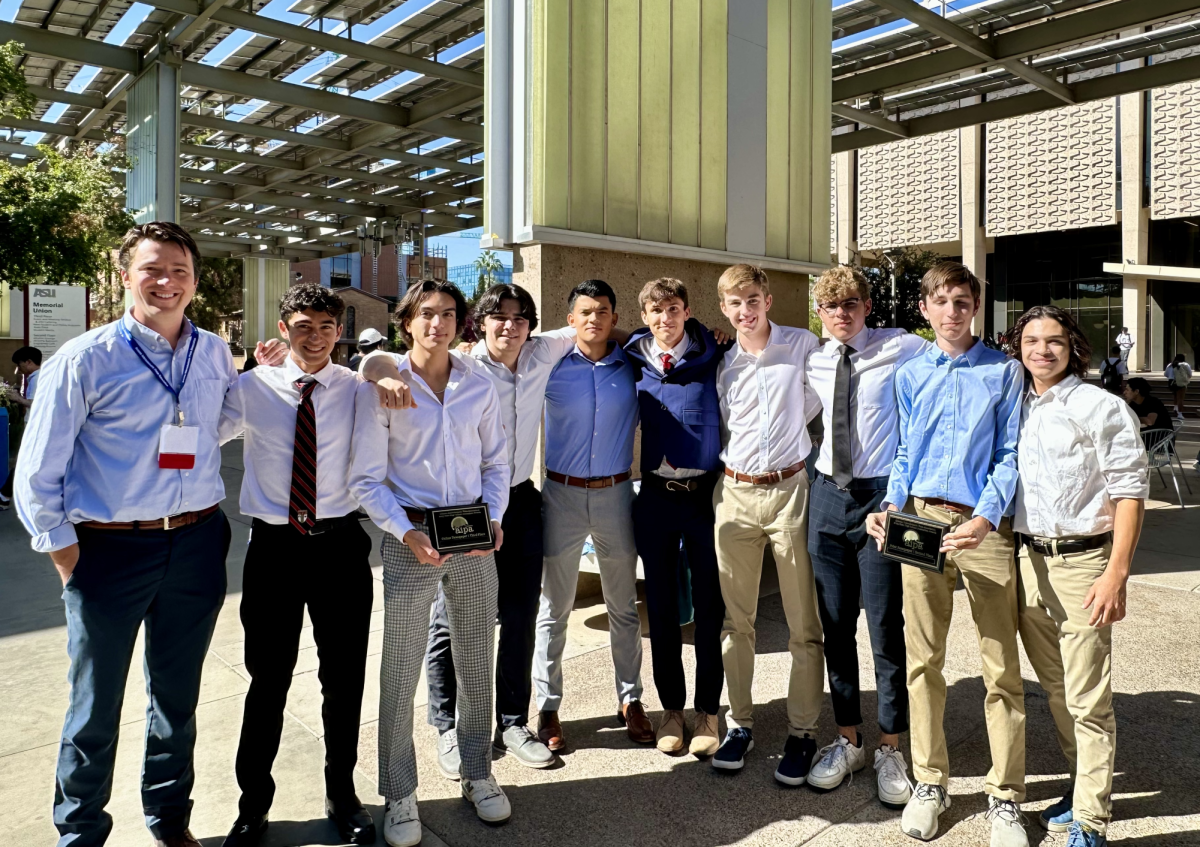Photo courtesy of Fr. Juan Pablo Murrufo del Toro | Mr. Cooper Davis ’10 gives students directions before heading out onto the river.
Kaidan Linse ’20
THE ROUNDUP
After every school year, for approximately 10 days, Mr. Cooper Davis ’10 leads a group of 20 Brophy students by canoe into the wilderness of Canyonlands National Park in southeastern Utah, a region known for its dramatic desert landscape carved out by the Colorado and Green Rivers. Altogether, the group travels over 55 miles during the course of the trip.
While on the trip, students examine a variety of issues such as sustainability, kinship with nature, spirituality of creation as well as read a “Laudato Si” encyclical, a book by Pope Francis in which he calls humans to take swift and global action on worldly issues.
However, one issue stands out amongst the rest: the water problem.
More than thirty million people now depend on the Colorado River for its water.
Wade Davis, unrelated to Mr. Cooper Davis ’10, is a Columbian-Canadian author who wrote “River Notes.” Davis says that “the vast percentage of the water diverted from the Colorado does not go to water lawns in Las Vegas, fill swimming pools in San Diego, or even grow lettuce, zucchini, squash, etc. beneath the desert sun at Yuma.”
Instead, the water of the Colorado goes to serve a very different purpose.
The Colorado’s main use is “to fatten cattle,” Wade Davis said in his book.
In California, Arizona and Nevada combined, roughly 85 percent of their water allotment goes to agriculture, with about half of the irrigated land again being devoted to the raising of meat.
“The production of a single pound of beef requires on average eighteen hundred gallons of water. The cultivation of alfalfa alone consumes 7.5 million acre-feet of water, or close to half of the entire flow of the Colorado,” Davis said.
During the trip, Mr. Davis leads group discussions on Wade Davis’s “River Notes” as well as offer his own personal opinions and beliefs on the water problem.
“The solution is simple, we just need to use [water] much more effectively,” said Mr. Davis.
“Right now we use 74 percent of our water on agriculture, and 70 percent of that water is used for the cultivation of beef in Arizona,” Mr. Davis continued.
In total, 50 percent of Arizona’s water allocation is used for the cultivation of beef.
Mr. Davis said that he ties the water problem back to cows every time.
“The reality is these massive cattle farms have been turned into housing communities that are water drainers,” Mr. Davis said.
Additionally, Clayton Kurtz ’20, a past participant of the trip, said “most of the Colorado’s water is used for farming alfalfa which goes directly to the cows,” supporting Mr. Davis’s beliefs.
However, there are also ways in which students can actively support fixing the problem.
Charlie Erlandson ’20, another past participant of the trip, believes that fixing the water problem comes down to personal decisions on what he decides to eat.
“Today, we have seen more and more restaurants offer non-animal meat alternatives to the classic burger,” said Erlandson.
“I believe choosing non-animal meat alternatives are something we can all do as a step in the right direction,” Erlandson said.
Another direct consequence of the Colorado water problem is how it affects the earth.
“Do we use every last drop of our water or do we let some of that water support our ecosystems? Do we let rivers exist so fish, birds and all other wildlife can all live?” Mr. Davis said.
Mr. Davis believes it comes down to valuing life within ecosystems. Taking all the water from the Colorado makes us eliminate part of Colorado’s biodiversity.
All in all, the ongoing Colorado water problem has shown to have negative consequences for multiple parties. It will only be a matter of time before human’s wasteful tendencies catch up to the rest of humanity.
























